Kazimieras Simonavicius University (KSU) was represented at the 2024 EAIE (European Association for International Education) Exhibition in Toulouse from September 17-20 by Ingrida Kutkienė, Head of International Relations. Kutkienė participated in the workshop titled “Future-proofing Your Funnel: Unlocking Gen Alpha Insights for Student Recruitment Excellence,” led by Alejandra Otero (getNEOus, USA) and Menno Kramer (Utrecht University).
The workshop focused on equipping educational institutions to engage Generation Alpha, the cohort expected to start their educational journeys in the coming two years. Alejandra and Menno guided participants through the latest recruitment strategies tailored for Gen Alpha, offering an immersive experience filled with practical activities and case studies. These tools aim to help institutions future-proof their recruitment efforts and meet the expectations of this new generation.
Ingrida Kutkienė shared, “This workshop provided me with valuable insights into adapting our recruitment strategies for the next generation. The emphasis on innovation and engaging prospective students as co-creators aligns perfectly with KSU’s forward-thinking approach.” Kutkienė further noted that EAIE serves as an exceptional platform for networking, fostering inspiring projects, and strengthening connections with both new partners and long-standing colleagues.
More about the event: EAIE Toulouse 2024 | International Education conference
The world is coping with a wide range of challenges such as migration, cyber-attacks, organised crime, and other new challenges, including a recent virus-led crisis. In the past years these challenges have also become security issues of importance to many European countries. Security challenges are important for any organisation or company, so experienced and well-trained security specialists are vital for development of any company.
At the moment, it is clear that European countries deal with these challenges in different ways. There are no unified standards and approaches as to how specialists should deal with these kind of challenges. There is a need for professional, well-trained specialists who can realise sound security risk management at various levels and in different kind of organisations.
During the intensive programme students will have the opportunity to learn about security risk management, develop skills, and gain knowledge about planning and implementing security management in various organisations. They will also learn about identifying and managing security risks. Of course, security education also requires practical knowledge and cooperation, so the course will include practical activities such as team challenges and exercises, and other activities that can be crucial factors in real situations.
The programme is organised by Turiba University (Riga, Latvia) in partnership with Kazimieras Simonavicius Universiry and few other European universities. On-site activities will take place on 7-11 May 2024 at Turiba University (Latvia).
Also, there will be 3 introduction on-line lectures where students will get to know other participants and will participate in lectures about security basics and security risk management. Dates: 11 April; 18 April; 25 April, 16:00- 17:30 (Vilnius time).
Participation in these on-line lectures is mandatory part of the programme. Students, who successfully pass the whole programme, will be awarded 3 ECTS which will be recognised as part of their study programme at KSU.
Participation in the programme is free of charge. Selected students will receive Erasmus+ scholarship of EUR 553 for the trip and stay costs, and Turiba University will cover accommodation costs in Students’ hostel (2 bedded rooms).
Participants – bachelor and master students of Law and Business field, any other students interested in security risk management topic (except the last year students). Only 5 places are available for KSU students.
Interested? Submit the Application form till 20 February by e-mail international@ksu.lt.

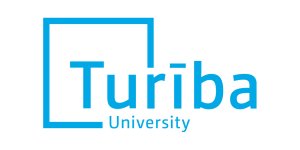

We are excited to announce that 3rd international scientific conference “Challenges to Modern Law: An International Perspective” will be held next week. The conference will take place in Kazimieras Simonavicius University (KSU) and online on 24-25 of April.
Let us introduce our main conference keynotes from distinguished academics.
First keynote speaker: Ralf Rogowski Emeritus Academic at School of Law of Warwick University, United Kingdom.
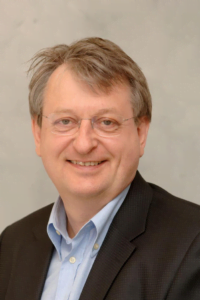
Ralf Rogowski joined Warwick Law School in 1993, after having taught at Lancaster University and at the Free University in Berlin. For many years he was Director of the Law and Sociology Programme and Co-Director of Warwick University’s Social Theory Centre. He has been Visiting Professor at the Department of Law of the University of Florence, at the University of Torino, and the Marco Biagi Foundation of the University of Modena. He has been Senior Emile Noel Fellow at New York University School of Law in 2006 and a Visiting Fellow at the universities of Wisconsin, Madison; Konstanz; and Maastricht. He has also been a long-standing Research Associate at the Wissenschaftszentrum für Sozialforschung (WZB) in Berlin. Since 1996 he is general editor of the book series Studies in Modern Law and Policy and since 2012 with S. Karstedt and D. Taenzler of the book series Law, Crime and Culture.
Ralf Rogowski will give a conference report on the topic ”Challenges to Modern Law: An International Perspective”.
Second keynote speaker: Liliana Tymchenko Associate Professor at Department of Social Sciences of European Humanities University, Lithuania.
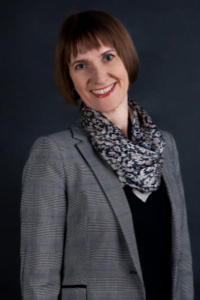
Liliana Tymchenko has many years of experience in teaching international law, the author of numerous publications on the problems of combating terrorism, recognition of states, human rights protection, existential issues of state development and the academic freedom. She was an expert of the Legal Reform Commission under the President of Ukraine (2019 – 2021), an expert of the Scientific Advisory Council of the Higher Administrative Court of Ukraine (2014 – 2017), a graduate of the programs of the American Bar Association, IREX, Coimbra Group Hospitality Scheme, Civic Education Project, etc. She defended her dissertation on “Political and Legal Aspects of International Terrorism” at the International Independent University of the Republic of Moldova and the Institute of State and Law of the National Academy of Sciences of Ukraine. She has a wealth of experience in higher education administration and is passionate about teaching methodology and management in higher education.
Liliana Tymchenko will give a conference report on the topic ”Values, stereotypes, and realities of international law teaching in the second quarter of the 21st century”.
At “Challenges to Modern Law: An International Perspective” conference, we aim to serve as a forum for the critical examination of modern legal issues and of the law as it functions in the international community.
Conference program you can find here: Conference programme
Participation is free of charge, but the registration form must be filled in. Registration form: https://forms.office.com/e/XASA6a0TXi
Zoom meeting link will be sent day before conference.
Certificates will be issued to registered participants after the conference. They will be available to participants who have attended at least one of the conference days.
More information about the conference: Challenges to Modern Law: An International Perspective | KSU
Conference e-mail: mlconference@ksu.lt

International scientific conference “Challenges to Modern Law: An International Perspective” will be held on April 24-25 by Kazimieras Simonavicius University (KSU). During the conference 16 participants from 9 countries will critically examine modern legal issues and law as it functions in international community. Conference will be held at the Kazimieras Simonavicius University and online.
Conference program you can find here: Conference programme
Participation is free of charge, but the registration form must be filled in.
Registration form: https://forms.office.com/e/XASA6a0TXi
Certificates will be issued for registered participants after the conference. They will be available to participants who have attended at least one of the conference days.
Zoom meeting link will be sent day before conference.
More information about the conference: Challenges to Modern Law: An International Perspective | KSU
Conference e-mail: mlconference@ksu.lt
The II International Scientific conference “Problems and Challenges of Contemporary Law in the Context of International Law 2022” will provide an opportunity to critically and creatively address all areas of international law. Applications of innovative methods in solving emerging problems will be presented during the sessions of the event.
The aim of the conference is to promote the public scientific discussion of Lithuanian and world researchers, raising the problems and challenges of modern law in the contexts of international law, commercial, family, criminal and other branches of law.
Participants: Lithuanian and foreign scientists – researchers, lecturers, students, law practitioners, and social partners. The scientific publications of the conference participants will be published in the conference proceedings.
Section topics: International law; Commercial law; Statute law; Criminal law; Family law.
More information: https://lnkd.in/gtba3nRW
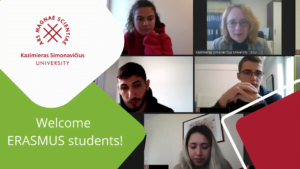
We are happy to host 29 Erasmus exchange students from Spain, Italy, France, and Turkey in the Spring semester of 2022. As every year, the Orientation Week was organized for students who came to Kazimieras Simonavičius University from abroad, during which the students got acquainted with the University and the study process, lecturers and each other.
This year, activities for international students were organized remotely, but this did not diminish the joy of getting to know the University and present their home countries. We hope that all students will return on site soon and meet their colleagues live!
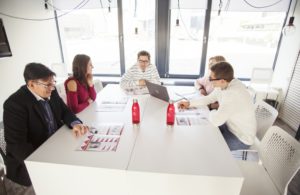
On 28 January, KSU team participated in the first partner meeting of the international project “Developing and Consolidating ICT Skills in a Digitalised Environment in Higher Education”, during which the project activities, deadlines and responsibilities of the partners were discussed.
During the implementation of the project, 3 new modules will be developed on ICT, business and life skills, an open learning digitalised platform will be created and training for teachers will be organised.
The project is implemented by 3 universities: St. Kliment Ohridski University of Sofia (Bulgaria), Kazimieras Simonavičius University (Lithuania) and University of Žilina (Slovakia).
Project is funded with support from the European Union under the programme Erasmus+.
 KSU partner – Algebra International university (Croatia) invites students to spend the summer in a meaningful and interesting way by participating in the distance Summer School, which will take place on July 5-25.
KSU partner – Algebra International university (Croatia) invites students to spend the summer in a meaningful and interesting way by participating in the distance Summer School, which will take place on July 5-25.
KSU students will receive a 5% discount on the total price.
Courses offered:
• Artificial intelligence;
• Cyber security;
• Branding;
• Data-driven storytelling.
All offered courses are 6 or 3 ECTS credits, so it is possible to transfer earned credit back to your home institution where you are presently enrolled in a degree program.
Registration is open until May 15, 2020.
All information and registration: https://bit.ly/2xVXlCn
 Kazimieras Simonavičius University Big Data Excellence Centre has become the official representative of Futures Platform in Lithuania. Futures Platform is a strategic insights tool that helps companies plan their operations in light of future changes.
Kazimieras Simonavičius University Big Data Excellence Centre has become the official representative of Futures Platform in Lithuania. Futures Platform is a strategic insights tool that helps companies plan their operations in light of future changes.
Developed and commercialized by Finnish scientists and specialists in 2016, the Trend Forecasting Tool provides a broad picture of social change in technology, economics, environment and politics. The unique Futures Platform information repository holds data on over 700 future phenomena. Futures Platforms operates on a SaaS (Software as a Service) principle.
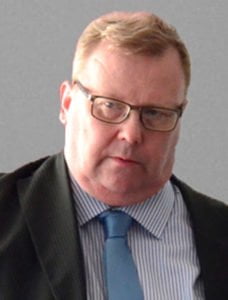
Prof. Dr. Jari Kaivo-oja
“What’s happening in the world right now illustrates the need for and the benefits of this type of tool,” says Dr. Jari Kaivo-oja, Professor of Kazimieras Simonavičius University, Head of the Master’s Programme in Future Insights and Strategic Management. According to him, the world has long lived under so-called VUCA (Volatility, Uncertainty, Complexity, Ambiguity) conditions. Volatility, uncertainty, complexity and ambiguity are elementary parts of many emerging phenomena, COVID-19 phenomena as well (https://www.futuresplatform.com/blog/covid-19-world-after). Under these real-life conditions, standard solutions are not appropriate and new agile methods are needed. Strategic insights and tools, such as Futures Platform, provide frameworks where both businesses, politicians and NGOs can explore the future, develop and test business strategies, and plan for change. This strategic foresight tool, which can be tailored to organizations for their special business and social needs, is widely used in European industries and business operations.
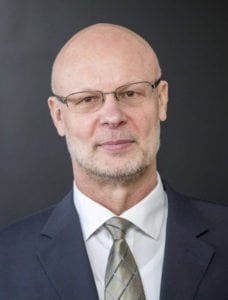
Prof. Dr. Arūnas Augustinaitis
The Futures Platform tool provides a wealth of detailed and useful information on global trends in various fields. This helps anticipate future changes and plan the organization accordingly, both in the short and long term, to keep up with global trends and to prevent investments in areas that will be less relevant in the future. Collaboration tools offered by the Futures Platform make it easy to involve team members or other stakeholders in processes.
“For example, municipalities can use the Futures Platform tool when planning urban and regional development scenarios, involving all stakeholders in the strategic process and see not only how their planned development correlates with global urban and regional development trends, but also with all stakeholders,” says Prof. Dr. Arūnas Augustinaitis, Lecturer of the Master’s Programme in Future Insights and Strategic Management.
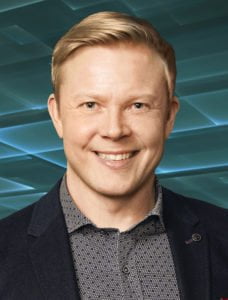
Saku Koskinen
“The recent global developments and the wild card, called Covid-19, has once again proven the importance of continuous foresight and horizon scanning work. We work daily with world leading organizations on future related processes and activities, and lately we have seen a strong signal from these organizations to build continuous and automated AI based foresight systems and solutions. There are two main reasons behind this development. First, a clear lack of time and resources to carry out these activities. Second, it is no longer enough to understand the trends and impacts of you own industry or domain, there is a need to be able to scan the future with a wider scope. That is why we at Futures Platform want to develop a world leading foresight platform,” says Saku Koskinen, Foresight Expert and Partner Futures Platform.
Creating updated future scenarios with Futures Platform is not a one-off project every few years. It is a consistent communication of the latest developments in trends that are important to the organization and its operations. A core feature of Futures Platform is the visual Trend Radar which visualizes which trends are affecting the future. By creating a digital radar around your theme of interest, you can see in a single image the holistic, 360-degree view of changes related to your theme. This tool helps CEOs and management teams work together with updated foresight analyses. The radar provides direct, one-click access to relevant articles and videos produced by experts on the future, providing a broader picture of how the world is changing. More about the Futures Platform can be found at www.futuresplatform.com. Currently, the Futures Platform is used by organizations such as Business Finland, Fortum, Fiskars Group, the European Commission’s Joint Research Center (JRC), IESE Business School in Barcelona, and other leading organizations.
For more information, please contact KSU Chancellor Darius Verbyla, E-mail: darius.verbyla@ksu.lt, Tel: +370 612 78 493
More about Big Data Excellence Centre here.
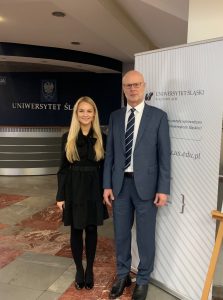 KSU Rector prof. dr. Arūnas Augustinaitis and Director of the Business School Deimantė Žilinskienė had a meeting with partners of the project (universities of Poland, Cyprus and Malta) and disscussed about the possibilities of improving students and teachers communication skills, learning competences by using state-of-the-art and digital methods. The meeting was held on the 28th-29th of November, in Katowice, Poland.
KSU Rector prof. dr. Arūnas Augustinaitis and Director of the Business School Deimantė Žilinskienė had a meeting with partners of the project (universities of Poland, Cyprus and Malta) and disscussed about the possibilities of improving students and teachers communication skills, learning competences by using state-of-the-art and digital methods. The meeting was held on the 28th-29th of November, in Katowice, Poland.
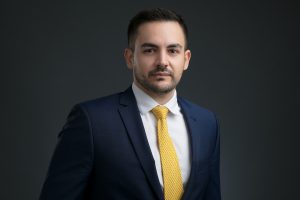 Our new International Aviation lecturer Diogenis Papiomytis has joined to KSU team this semester. He heads the Commercial Aviation research and consulting practice of Frost & Sullivan, a global aviation consultancy. He is responsible for the delivery of industry research reports and strategy consulting projects, with clients coming from Airlines, Airports, Aircraft Manufacturing and Aviation Aftermarket segments. He previously worked in the Corporate Strategy department of c and as a Senior Lecturer in Aviation Studies at Buckinghamshire New University in the UK. Diogenis holds a BA (Hons) in Modern Languages and International Business, a MSc in Air Transport Management from Cranfield University and a MBA from Cass Business School at London City University.
Our new International Aviation lecturer Diogenis Papiomytis has joined to KSU team this semester. He heads the Commercial Aviation research and consulting practice of Frost & Sullivan, a global aviation consultancy. He is responsible for the delivery of industry research reports and strategy consulting projects, with clients coming from Airlines, Airports, Aircraft Manufacturing and Aviation Aftermarket segments. He previously worked in the Corporate Strategy department of c and as a Senior Lecturer in Aviation Studies at Buckinghamshire New University in the UK. Diogenis holds a BA (Hons) in Modern Languages and International Business, a MSc in Air Transport Management from Cranfield University and a MBA from Cass Business School at London City University.
Our lecturer Diogenis Papiomytis in CNBC: https://www.cnbc.com/video/2019/03/13/boeing-issue-has-brand-implications-as-well-analyst-says.html